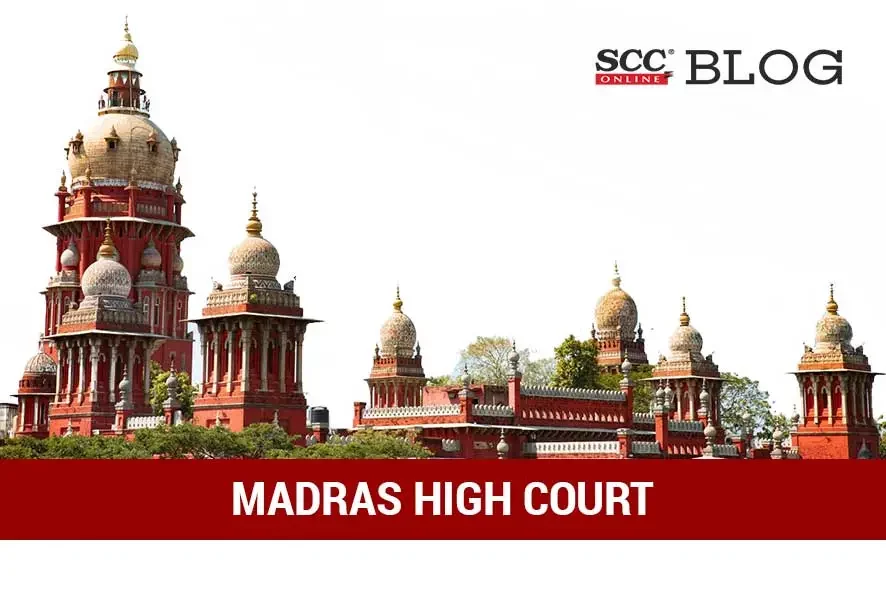Madras High Court: In a batch of writ petition filed to direct Tamil Nadu Public Service Commission (‘TNPSC’) for permitting the petitioners to participate as eligible candidate in the direct recruitment to the post of Civil Judge in the Tamil Nadu State Judicial Service vide Advertisement and Notification dated 01-06-2023, as a special extraordinary case in view of the delay in enrolment with the Bar Council of Tamil Nadu and Puducherry caused by the COVID -19 Pandemic induced lock down , the division bench of S. Vaidyanathan* and K. Rajasekar, JJ. while dismissing the writ petitions, said that in the absence of any arbitrariness, infringement and fickleness, the petitioners are not entitled to any relief.
The petitioner 1 prayed to quash the Advertisement and Notification imposing the conditions that “fresh law graduates must have obtained the bachelors degree of law within a period of three years prior to the date of Notification” as illegal and consequently direct the Tamil Nadu Public Service Commission (‘TNPSC’) to consider the case of the petitioner as fresh law graduate due to non-inclusion of Covid-19 pandemic period in the present notification by TNPSC. Further, the other petitioners also prayed for directing the TNPSC to permit them to participate as eligible candidates in the direct recruitment to the post of Civil Judge.
Background:
There was no recruitment taken place for the post of Civil Judge in Tamil Nadu after the year 2018 and the TNPSC in 2023, issued the notification dated 01-06-2023 for the post of Civil Judge. The petitioner was made ineligible to apply for the said post under the category fresh law graduate. No concession was given in respect of the year of completion of the law degree, which deprived her of the golden opportunity of participating in the examination. It was her stand that the increase in upper age limit alone is not sufficient, and the condition pertaining to the year completion must be extended by another two years, taking note of the previous Government Orders. Since the existing Rules regarding Research Assistants / Research Assistants cum Law Clerks are silent, she may be allowed to write the judicial service examination, as she is not eligible to apply either under the category fresh law graduate nor under practising advocate. Therefore, she prayed for setting aside the relevant clause in the Notification.
Analysis:
The Court noted that the main grievance of the petitioners was that even though they fall well within the cut off age relaxation prescribed in the notification dated 01.06.2023, they have been deprived of their rights in submission of online applications on the ground that they do not come within the purview of eligibility.
The Court individually analysed the case of petitioners. The Court said that petitioner 1 after taking up the task of Research Assistant, had suspended her practice, thus, she does not have three years’ experience to term her as a practising Advocate because she had only two years and one month practice as on the date of notification. Thus, her application cannot be entertained, and she is ineligible to apply for the post.
The Court noted that petitioner 2 has sought relaxation of age by excluding the Covid period. Further, it said that though she has sufficient years of practice as on the date of notification, his date of birth was 10-12-1979, thereby he crossed the maximum upper age provided in the notification, as the maximum upper age limit prescribed for SC/ST in terms of 4(A) was 42 years.
The Court noted that the last recruitment took place in 2018 and on account of Covid intervention, no recruitment was conducted. Further, it said that the Government, taking note of the pitiable condition of candidates, amended the Rules by extending two years.
The Court said that petitioner no.3 and 4 fall short of four months to bring them under the ambit of practising advocate.
After taking note of Rachna v. Union of India, (2021) 5 SCC 638, the Court said that unless the public policy is capricious and totally arbitrary, the Court cannot blindly stall the selection process, which is within the realm of the executive, as it would affect the smooth function of better administration. Further, the Court said that in the above judgment it is explicitly delineated that the consideration of concession was on account of Covid-19 pandemic and such relaxation cannot be demanded as a matter of right.
Thus, the Court held that no relaxation can be granted in the present case, as there was no infringement of fundamental rights guaranteed by the Constitution or Statutory Rules warranting interference.
Further, the Court said that in the notification, which is in accordance with the Rules, it was specifically prescribed that a candidate must be a practising advocate on the date of notification. However, petitioner 1 is not a Practising Advocate. After placing reliance on All India Judges’ Assn. (II) v. Union of India, (1993) 4 SCC 288, the Court said that minimum three years of practice as Advocate as one of the essential qualifications for recruitment as the Judicial Officer at the lowest rung in the judicial hierarchy.
Moreover, it said that the petitioners cannot compel the Commission to fix the cut-off date and relax the age in a particular manner they want.
Further, the Bench suggested that judicial service examinations shall be conducted every year to minimize the pending litigations, as it is noticed that certain cases are pending for more than three decades, since future vacancies are known on account of retirement of Judicial Officers.
[K. Indulekha v Chairman, 2023 SCC OnLine Mad 5086, decided on 31-07-2023]
*Judgment Authored by: Justice S. Vaidyanathan
Advocates who appeared in this case :
For Petitioner: Advocate E.V.Chandru, Advocate S.P. Harikrishnan;
For Respondents: Advocate R.Bharanidharan, Advocate B. Vijay, Advocate R. Bharanidharan.






